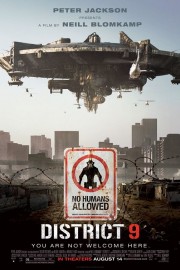District 9
Sometimes, filmmakers just wanna shake things up. Box-office is secondary in these instances; creativity is paramount. See Spielberg’s “A.I.,” Burton’s “Sweeney Todd” and “Ed Wood,” and every other film by Steven Soderbergh. With “District 9,” co-written and directed by his choice to direct his ill-fated “Halo” film Neill Blomkamp, Peter Jackson is eschewing the epic scope of his “Lord of the Rings” trilogy and “King Kong” to produce a sci-fi film that takes the genre back to its’ roots as parable and provocation.
Admittedly, it isn’t the most subtle use of sci-fi as metaphor we’ve seen- like allegorical works like “Planet of the Apes” and the original “The Day the Earth Stood Still,” one only need look on the surface to see where Blomkamp and Terri Tatchell are coming from. The time is the later part of the 20th Century, and a spaceship has come to a halt above Johannesburg, South Africa. When it is opened up by the military, they find a million-plus aliens, malnourished and unable to get their ship going again. The military houses them in a quarantined-off section of land that becomes known as District 9, which quickly becomes a slum. We see the bug-like aliens- who become known to humans as prawns- in this habitat, and it’s not a pleasant site (if you get easily sick, probably best to stay away).
A tenuous cohabitation commences, but humans are still wary of the prawns, whose weaponry is of special significance to the humans (gee, I can’t imagine why…). Nowadays, District 9 is a place of corruption and illegality. So the government has hired MNU- a major corporation, and the 2nd largest weapons manufacturer in the world- to evict the prawns (which are cockroach-like creatures), and relocate them into a new home, which looks strikingly like a concentration camp. The bureaucrat in charge of serving the eviction notices is Wikus Van De Merwe (played by Blomkamp’s long-time friend Sharlto Copley in a terrific performance that isn’t as simple as being your typical hero), but while making the rounds, he comes into contact with a fluid a particular group of aliens (led by a Mr. Johnson and his young son) are distilling for purposes that are right now unknown. The fluid effects Wikus in ways he never really imagined, making the rest of the film fundamentally a man-on-the-run thriller where he must work with the prawns in order to go back to his regular self.
Blomkamp’s story is inspired by one of his short films (“Alive in Joburg”), but other quotations about in the film- I’ve heard/read comparisons to “Slumdog Millionaire,” “City of God,” “Planet of the Apes,” Cronenberg’s “The Fly,” even “Robocop” for one particular sequence. But the point isn’t what it reminds you of, but how it takes left turns away from such comparisons. The primary subtextual element is a thinly-veiled commentary on apartheid, the South African practice of systematic racial segregation that was in effect in the country until the mid ’90s, but another one exists that few I’ve read/heard comment on. That is the very American practice of government work being handled by private businesses- you’ve no doubt heard of many instances when it comes to Iraq- especially when it comes to vital interests- oil in Iraq, alien weaponry and research in “District 9.”
Blomkamp’s documentary-like filming of “District 9” brings these ideas home even clearer- he and Jackson, free of studio meddling (the $30 million budget was Jackson’s), take what is possible with CG further than what we’ve seen before in showing the grim reality of life in District 9 as if through the eyes of news crews and documentary filmmakers. The film is a technical marvel beyond what anyone else has done so far this year- yes, even “Transformers: Revenge of the Fallen” and “Star Trek.” This comes from creative freedom, and this is where “District 9” succeeds most. By giving themselves such freedom, Jackson and Blomkamp experiment with different ways of filming that more money- and thus studio oversight- can’t really offer. Is it too much to hope for “District 9”- whose effects, sound design, and other aspects are all Oscar-worthy- to be remembered over the big mega-blockbusters come January?
Best of all is the way Jackson and Blomkamp bring the action down to a personal level, as Wikus goes on the run from his employers after his exposure, eventually finding himself in District 9, and made aware of a secret agenda on the part of Mr. Johnson’s that makes more visual marvels possible, as well as an action sequence in MNU that serves as an example as to what Blomkamp and Jackson might have done with a “Halo” movie. But if “Halo” had happened, maybe we wouldn’t have gotten this movie, which is more provocative, bolder (that R-rating really gets pushed), and smarter than “Halo” would have been, and thus a more worthy example of these filmmaker’s gifts as masters of fantasy.










